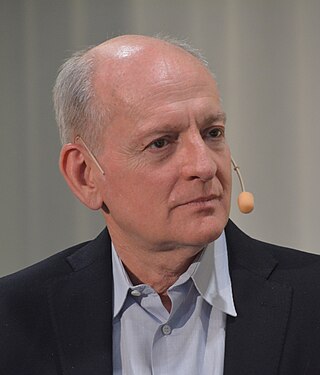Stuart J. Russell
British computer scientist and author (born 1962) From Wikipedia, the free encyclopedia
Stuart Jonathan Russell OBE (born 1962) is a British computer scientist known for his contributions to artificial intelligence (AI).[5][3] He is a professor of computer science at the University of California, Berkeley and was from 2008 to 2011 an adjunct professor of neurological surgery at the University of California, San Francisco.[6][7] He holds the Smith-Zadeh Chair in Engineering at University of California, Berkeley.[8] He founded and leads the Center for Human-Compatible Artificial Intelligence (CHAI) at UC Berkeley[9] and the International Association for Safe and Ethical Artificial Intelligence (IASEAI).[10] Russell is the co-author with Peter Norvig of the authoritative textbook of the field of AI: Artificial Intelligence: A Modern Approach used in more than 1,500 universities in 135 countries.[11]
Stuart Russell | |
|---|---|
 Stuart Russell in 2019 | |
| Born | Stuart Jonathan Russell 1962 (age 62–63) Portsmouth, England |
| Citizenship | British; American |
| Alma mater | University of Oxford (BA) Stanford University (PhD) |
| Known for | Artificial Intelligence: A Modern Approach |
| Awards |
|
| Scientific career | |
| Fields | Artificial Intelligence[3] |
| Institutions | |
| Thesis | Analogical and Inductive Reasoning (1987) |
| Doctoral advisor | Michael Genesereth[4] |
| Doctoral students | |
| Other notable students | |
| Website | people |
Education and early life
Russell was born in Portsmouth, England. He attended St Paul's School, London, where he was 1st scholar. He studied physics at Wadham College, Oxford, and was awarded his Bachelor of Arts degree with first-class honours in 1982. He moved to the United States to complete his PhD in computer science at Stanford University in 1986 for research on inductive reasoning and analogical reasoning supervised by Michael Genesereth.[4][12] His PhD was supported by a NATO studentship from the UK Science and Engineering Research Council.[12]
Career and research
Summarize
Perspective
After his 1986 PhD, he joined the faculty of the University of California, Berkeley as a professor of computer science.[13] From 2008 to 2011 he also held an appointment as adjunct professor of Neurological Surgery at the University of California, San Francisco, where he pursued research in computational physiology and intensive-care unit monitoring.[6][7] He is also an Honorary Fellow at Wadham College, Oxford.[8] His research in the area of artificial intelligence[14] includes contributions to machine learning,[15] probabilistic reasoning, knowledge representation, planning, real-time decision making, multitarget tracking, computer vision,[16] and inverse reinforcement learning.[9] He has also been an active participant in the movement to ban the manufacture and use of autonomous weapons.[17][18]
In 2016, he founded the Center for Human-Compatible Artificial Intelligence at UC Berkeley, with co-principal investigators Pieter Abbeel, Anca Dragan, Tom Griffiths, Bart Selman, Joseph Halpern, Michael Wellman and Satinder Singh Baveja.[19] Russell has published several hundred conference and journal articles[6][20][21] as well as several books, including The Use of Knowledge in Analogy and Induction and Do the Right Thing: Studies in Limited Rationality (with Eric Wefald).[16][22] Along with Peter Norvig, he is the author of Artificial Intelligence: A Modern Approach,[23] a textbook used by over 1,500 universities in 135 countries.[24] He is on the Scientific Advisory Board for the Future of Life Institute[25] and the advisory board of the Centre for the Study of Existential Risk.[26]
In 2017 he collaborated with the Future of Life Institute to produce a video, Slaughterbots, about swarms of drones assassinating political opponents, and presented this to a United Nations meeting about the Convention on Certain Conventional Weapons.[27][28]
In 2018 he contributed an interview to the documentary Do You Trust This Computer?.[29]
His book, Human Compatible: Artificial Intelligence and the Problem of Control, was published by Viking on 8 October 2019.[30] His work is aligned with Human-Centered Artificial Intelligence themes. His former doctoral students include Marie desJardins, Eric Xing and Shlomo Zilberstein.[4]
Russell gave the 2021 Reith Lectures, broadcast on BBC Radio 4, on Living with Artificial Intelligence[2][31] with lectures on "The Biggest Event in Human History",[32] "AI in warfare",[33] "AI in the economy"[34] and "AI: A Future for Humans".[35]
In March 2023, Russell signed an open letter from the Future of Life Institute calling for "all AI labs to immediately pause for at least 6 months the training of AI systems more powerful than GPT-4". The letter has been signed by over 30,000 individuals, including AI researchers such as Yoshua Bengio and Gary Marcus.[36][37] In a January 2025 article in Newsweek, Russell wrote "In other words, the AGI race is a race towards the edge of a cliff."[38]
Awards and honors
Russell was co-winner, in 1995, of the IJCAI Computers and Thought Award at the International Joint Conferences on Artificial Intelligence, the premier international award in AI for researchers under 35.[39] In 2022, he received the IJCAI Award for Research Excellence, only the second person (after Hector Levesque) to win both of IJCAI's main research awards. He is a fellow of the Association for the Advancement of Artificial Intelligence (AAAI),[1] elected in 1997, the Association for Computing Machinery (ACM)[40] (2003) and the American Association for the Advancement of Science (2011).[41] In 2005, he was awarded the ACM Karl V. Karlstrom Outstanding Educator Award.[42] In 2012, he was appointed to the Blaise Pascal Chair in Paris, awarded to "internationally acclaimed foreign scientists in all disciplines," as well as the senior Chaire d'excellence of France's Agence Nationale de la Recherche.[43]
Russell served as vice chair of the World Economic Forum's Council on AI and Robotics and is currently a member of its Global AI Council. Other awards he has received include the National Science Foundation's Presidential Young Investigator Award, the World Technology Award, the Mitchell Prize, and the Association for the Advancement of Artificial Intelligence Outstanding Educator Award.[16] He was appointed Officer of the Order of the British Empire (OBE) in the 2021 Birthday Honours for services to AI research.[44]
References
Bibliography
External links
Wikiwand - on
Seamless Wikipedia browsing. On steroids.
